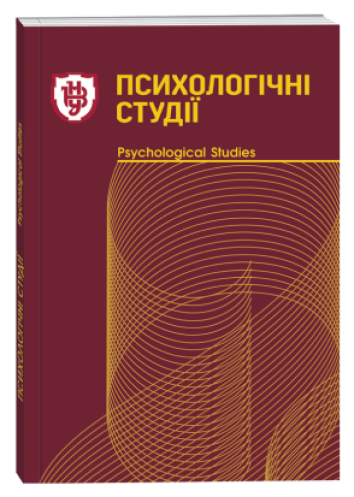ПСИХОЛОГІЧНИЙ АНАЛІЗ СУБ’ЄКТИВНОГО СПРИЙНЯТТЯ ПІДЛІТКОМ ЗНАЧУЩИХ ДОРОСЛИХ В УМОВАХ ДИСТАНТНОЇ СІМ’Ї
DOI:
https://doi.org/10.32782/psych.studies/2022.1.1Ключові слова:
дистантна сім’я, сімейна ідентичність, сімейна соціограма, дитячо-батьківські взаємини, структура сім’ї, сімейні роліАнотація
У статті представлено використання проективної експресивної методики «Сімейна соціограма» Е. Ейдеміллера у роботі з підлітками, батьки яких тривалий час перебувають за кордоном на заробітках. Запропоновано критерії аналізу малюнкових робіт досліджуваних. Висвітлено суб’єктивне сприйняття підлітком ідентифікацій фігур матері та батька.
Посилання
Куб’як Н. Деякі аспекти підготовки вчителів до роботи з дистантними сім’ями. Вісник Львівського університету. Серія: педагогічні науки. 2005. Вип. 20. С. 56–61.
Лялюгене И. Ю. Влияние трудовой миграции родителей на социализацию подростков [Електронний ресурс] / И. Ю. Лялюгене, Л. А. Рупшене. URL: http://www.isras.ru/socis_2008_ 1.html.
Соціально-психологічні проблеми виховання дітей в дистантних сім’ях і методично- теоретичні засади підготовки спеціалістів до роботи з ними : матеріали Всеукраїнської науково-практичної конференції, (30–31 жовтня 2008). ЧНУ ім. Юрія Федьковича. Чернівці : Технодрук, 2008. 176 с.
Трубавіна І. М. Сучасні підходи до розуміння сім’ї у наукових дослідженнях. Соціальна робота в Україні: теорія і практика. 2005. С. 38–47.
Эйдемиллер Э. Г. Психология и психотерапия семьи / Э. Г. Эйдемиллер, В. В. Юстицкис. 2001. 656 с.
Ядов В. А. Социальные и социально-психологические механизмы формирования идентичности личности. Психология самосознания : хрестоматия / ред. Д. Я. Райгородский. 2007. С. 589–602.







